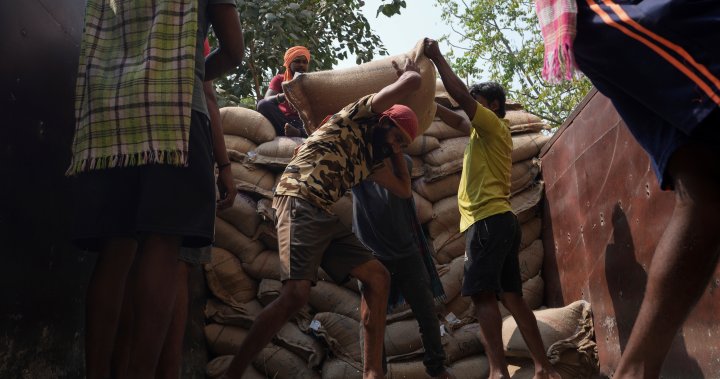Three days after Russia withdrew from the Black Sea grain deal, the Indian government announced on Thursday that it will be stopping all exports of non-Basmati white rice with immediate effect.
The timing of the move comes amid a wave of extreme heat scorching many parts of the globe, all culminating in growing questions about the security of food supply chains around the world.
According to the Food and Agricultural Organization (FAO) of the United Nations, India accounts for more than 40 per cent of the world’s rice exports.
In a statement Thursday, the country’s ministry of consumer affairs, food and public distribution cited the need to “ensure adequate availability of Non-Basmati White Rice in the Indian market and to allay the rise in prices in the domestic market.”
According to the ministry, non-Basmati white rice accounts for a quarter of all Indian rice exports.
This decision comes as Indians have been struggling with high food prices. In September of last year, the government imposed a 20 per cent export duty on rice to lower the price in the domestic market. Despite this, the retail prices of rice have been rising in India. According to the government, the retail price has increased 11.5 per cent in the last year and 3.0 per cent over the last month.
“The prohibition on export of Non-Basmati White Rice will lead to lowering of prices for the consumers in the country,” the ministry said.
But the impact globally remains to be determined.
On Monday, Russia withdrew from the Black Sea grain deal, under which it allowed the passage of ships from Ukrainian ports on the Black Sea carrying food grain shipments.
Kremlin spokesperson Dmitry Peskov said Russia would suspend the Black Sea Grain Initiative until its demands to get its own food and fertilizer to the world are met. While Russia has complained that restrictions on shipping and insurance have hampered its agricultural exports, it has shipped record amounts of wheat.
“When the part of the Black Sea deal related to Russia is implemented, Russia will immediately return to the implementation of the deal,” Peskov said.

A day after Russia withdrew from the agreement, Canada called on Moscow to resume its participation in the Black Sea grain deal to avoid “further shocks to global food systems.”
Foreign Affairs Minister Melanie Joly and International Development Minister Harjit Sajjan issued a joint statement on Tuesday, saying Russia’s withdrawal from the agreement was a “de facto blockade.”
The deal last year was a crucial breakthrough, brokered by Turkey and the United Nations, that allowed Ukraine to ship 32.8 million metric tons of grain. More than half of this export went to developing nations around the world that had been cut off during Russia’s invasion.
“(Under the Black Sea agreement), the World Food Program has shipped more than 725,000 tons (of food grains) to support humanitarian operations, relieving hunger in some of the hardest hit corners of the world including Afghanistan, the Horn of Africa and Yemen,” United Nations Secretary-General António Guterres said on Monday.
The initiative is credited with helping lower the soaring prices of wheat, vegetable oil and other food commodities. Ukraine and Russia are both major global suppliers of wheat, barley, sunflower oil and other affordable food products that developing nations rely on.
Ukrainian President Volodymyr Zelenskyy said Monday evening the deal must continue and could operate without Russian participation.

While the impact is expected to be felt in several developing countries in Africa and western Asia, United Nations Black Sea Initiative Joint Coordination Centre data shows that food shipments from the Black Sea were meant for destinations across the world.
China (eight million metric tons), Spain (six million metric tons), Turkey (3.2 million tons) and Italy (2.1 million tons) have been the biggest recipients of cargo from Black Sea ports since the deal was struck.
The implications will be felt all over the world, and an Oxfam Canada spokesperson told Global News they were concerned about the ripple effects the suspension of the deal could have on food prices, food donation drives and inequity in Canada.
It could also offer an opportunity to create more breadbaskets around the world, the spokesperson said. Earlier this month, the UN released its annual State of Food Security and Nutrition in the World report, which said that approximately 725 million people faced chronic hunger in 2022. This figure is up from 613 million in 2019.
The war in Ukraine has caused the UN to update its projections on world hunger.
“Updated projections show that almost 600 million people will be chronically undernourished in 2030 … this is about 119 million more undernourished people than in a scenario in which neither the pandemic nor the war in Ukraine had occurred, and around 23 million more than in a scenario in which the war had not happened,” the report said.

© 2023 Global News, a division of Corus Entertainment Inc.




